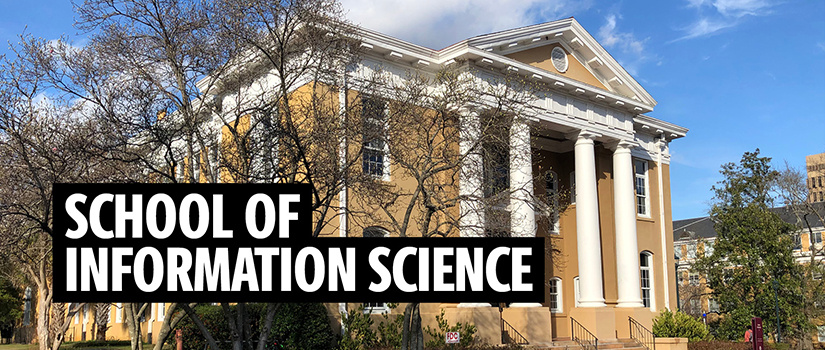Posted April 27, 2020
By Rebekah Friedman, communications manager, rebekahb@mailbox.sc.edu, 803-576-7270
The School of Library and Information Science is now the School of Information Science, following a vote of approval by the University of South Carolina Board of Trustees at an April 24 meeting.
The new moniker will support continued growth of the school’s undergraduate offerings, expand options for graduate students and bring it in line with peer programs that have already undertaken similar name changes.
“We’ve always sought to give students options when it comes to what they study and the careers they can pursue after graduation,” says Tom Reichert, dean of the College of Information and Communications. “Now we have a name that better conveys that versatility and opens the door for us to offer even more.”
The undergraduate program — comprised of the information science major and informatics minor — teaches students to collect, analyze and share data within organizations. Its comprehensive approach spans everything from leadership skills to coding, meaning graduates can work as data analysts, web developers, information architects and even chief information officers. It also serves as a talent pipeline for the school’s nationally ranked Master of Library and Information Science program.
Because information science encompasses the full spectrum of the school’s academic offerings, faculty and leadership believe the new name will better resonate with prospective students at all levels.
“We know the market is strong for information science majors helping companies, governments and nonprofits take advantage of their data to better meet their goals,” says David Lankes, director of the School of Information Science. “Librarians, who require a master’s degree, are an invaluable profession to do this, but we also need passionate information professionals doing the same in the technology and finance sectors. Our name now reflects the expanded impact our graduates can make.”
South Carolina isn’t the first library science program to broaden its academic horizons.
The iSchools consortium — a collective of 115 information science schools working to better communicate what the discipline offers — has gained momentum since its founding in 2005. South Carolina joined in 2017.
Additionally, only a dozen of the 64 American Library Association-accredited LIS programs include “library” in their name. Of those, just one is ranked in U.S. News & World Report’s top 10.
In December, the school’s faculty voted to change the name. Leading up to that decision, they spent two-and-a-half years collecting feedback through one-on-one conversations, town halls and surveys of alumni, faculty and students.
While many expressed excitement about the potential change, some worried it suggested a shift away from librarianship education and a rejection of the librarian identity altogether.
But in the past four years, the school has implemented a number of initiatives to bolster its reputation as a leader in librarianship, including:
- A cohort program with South Carolina K-12 school districts that trains classroom teachers to fill critical school librarian openings.
- An increased emphasis on preparing the state’s workforce through community literacy efforts.
- A Fellows program that taps high-profile library experts to advise students, faculty and administrators.
- A “sister school” relationship with NCUU, a top library science program in Taiwan.
The school will continue investing in tenure-track library faculty and offering the Master of Library and Information Science degree.
It also plans to offer new degrees at the graduate and undergraduate levels. Faculty are already working with the School of Journalism and Mass Communications to develop collaborative programs in data, media and society.
“Strong libraries are an essential part of strong communities, and that is a mission we remain committed to,” Lankes says. “Strong communities also require strong data scientists, chief information officers, analysts and system developers. The School of Information Science is positioned to provide all of that to the citizens of South Carolina and beyond.”
